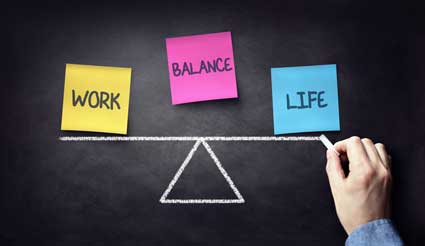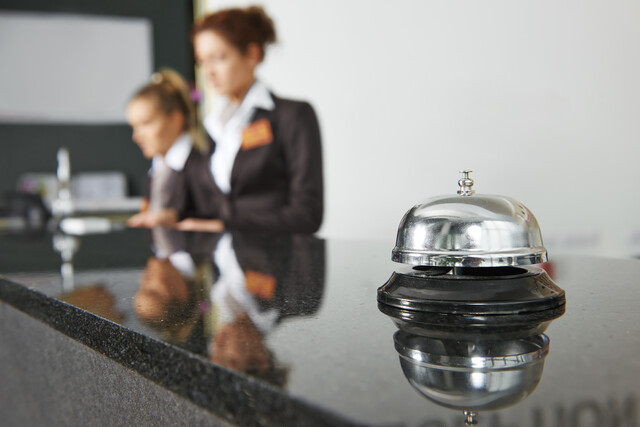Quality customer service begins with the appearance of your restaurant, at its very entrance. Is it clean? Is the glass on your doors sparkling, or marred by fingerprints? Is there trash on your sidewalk? Are clean ashtrays and floor mats present and available? Any negative responses to these questions might result in potential diners eschewing your establishment for another. Cleanliness is truly next to Godliness in the restaurant industry, although a few (very few) restaurants actually create a laid-back "roadhouse" look, encouraging guests to leave peanut shells on the floor. The initial waiting area should have a place to sit, coat hooks, an umbrella stand, and hopefully storage for strollers and bags.
Obviously, the sight and ambiance of your restaurant will make its own impression on your guests, and will ultimately determine your clientèle for you. If your restaurant features a live heavy metal band every night, a party of Jesuit priests may dine with you once, but are not apt to return to Chez Nous often. While a busy restaurant is a successful restaurant -- and not all service standards can be upheld during high-volume periods -- busy does not have to equate with dirty, or sloppy. Stacks of food-crusted plates left on tables are a visual turn-off to guests, and should be bussed out of sight as soon as possible. Ensure your unseated tables are clean, with a "uniform" look where cutlery, condiments, and napkins are all arranged identically.
Quality customer service continues with your hosts, or whoever will be greeting your guests. A policy or sign that invites guests to seat themselves may seem cost-effective, but actually it will contribute to chaos as servers become overwhelmed and don't know who to serve first, or next.
It is imperative that your host, greeter, or maitre d's will be extroverts, genuinely like people, and have expert communication skills. Their manners and uniforms should be impeccable. To further ensure a positive first impression:
HAVE THE FRONT DESK FACE THE DOOR. This ensures guests know where to go when they enter. Similarly, hosts should never have their backs to any entering diners, or ignore guests to have their own conversations.
GREET GUESTS AS SOON AS POSSIBLE, with both a smile and eye contact. In a "rush" situation, where not every guest can be formally greeted verbally, a wave or gesture of acknowledgment is the least a host can do to ensure the guest knows they've been seen.
GREET GUESTS WITH "GOOD EVENING, MAY I HELP YOU?" (Or Morning, or Afternoon as appropriate.) Use guests' names, if known, and never use, "Do you have a reservation?" as an initial greeting.
ASK HOW MANY ARE IN A GUEST'S PARTY, rather than assume everyone waiting in a group is together. Confirm a guest's reservation, if need be.
ROUND QUOTED WAIT TIMES UP, INSTEAD OF DOWN. If Hosts estimate wait times to be 20 minutes, they are better off quoting 25 minutes, instead of 20. A guest would rather prepare to wait 25 minutes and be seated in 15 minutes, than prepare to wait 15 minutes and wait for 25.
Offering to take coats and bags is gracious, but may be a liability for your business, especially if any items become lost or damaged. Most guests realize that restaurants generally will not assume responsibility for their property, but confirm this with your insurer.
Once guests are seated, customer service continues with the wait staff, and they should be trained and ready to deliver the finest service possible. Waiters need to be able to "'read" their tables and play a variety of roles to satisfy guests. Some waiters have an entertainment style; some are more professional or "all business." It behooves a waiter to be able to use both service styles, depending on how they "read" the table. Couples on an obvious date will naturally want privacy, to focus on each other. Diners having a business dinner or lunch should also be given plenty of space and not interrupted.
Waiters should wait until each guest is comfortably seated -- large families can take several minutes to arrange themselves -- but still greet guests as soon as possible -- optimally within one minute or less. Diners will generally quiet themselves automatically to place their orders, but waiters should wait for natural lulls in conversations instead of interrupting. Using a smile and natural eye contact, waiters should greet guests, ask if they have dined at the restaurant before, and apprise them of any specials. You may wish to train your wait staff to use a "spiel," which includes a standard formal greeting, and some of your featured items.
Modern ordering protocols suggest that children should be attended to first, then older ladies, then younger ladies, then older gentlemen, then younger gentlemen. In the rare case of royal figures dining at your establishment, those of the highest standing should be served first.
Waiters need to "own" your menus and be well-versed in the ingredients and the preparation times of your entrées. A guest who claims to be in a hurry should not expect a well-done steak to be at their table in 10 minutes. As in seating, waiters would be wise to slightly exaggerate the cooking times of various entrées. If a well-done steak generally requires 20 minutes to prepare, the waiter should quote a wait time of 25 minutes instead of 15.
1. If possible, serve each guest a glass of ice water before actual beverage service. It's not only gracious, but it'll actually curb the guest's hunger, since most hunger signals are actually dehydration signals.
2. Anyone who appears under 30 years of age who orders alcohol should be "carded" (have their age checked). Even if their 21st birthday is the next day, they cannot be served alcohol. Ensure that your servers are vehement about carding guests, as "sting" operations are commonplace and may result in the server and you being fined or jailed.
3. Write orders down, and repeat them back to the guests. This minimizes the chance of the guest ordering the wrong item and sending it back.
4. Waiters should suggest entrées that they personally enjoy. They can, and should, "up-sell" by offering more expensive items, but guests shouldn't feel extorted, either.
5. Give parents the option of having their children's meals prepared first, if possible. Children can tend to become rambunctious until their food is served.
6. If guests are in a hurry, suggest items that can be prepared quickly.
7. If a guest has any allergies whatsoever, make sure to inform the back of the house, and have a chef come to the table, if possible.
8. Always suggest appetizers, since semi-full guests are happier than ravenous guests.
9. Place orders as soon as possible.
10. If a guest's meal is taking longer than anticipated, waiters should communicate with management and the back of the house, and keep the guest informed of the meal's progress. Ignoring or hiding from guests only adds to their irritation.
11. Constantly monitor the water or beverage levels at the table and provide refills whenever necessary. Serve beverages from the right side of the guests, and serve food from the left side of the guest.
12. Shortly after the meals are served, waiters should ask guests if everything is prepared to their liking. If not, guests can eat half or two-thirds of a meal, complain about it and demand it be taken off the bill.
13. Try not to serve plates over guest's heads, or thrust pitchers into their midst. "May I refill your glass?" Will clue most guests to hand their glasses to the waiter.
14. Once guests are done, clear their empty plates as soon as possible. If there is still a lot of an entrée remaining, but it has remained untouched for many minutes, ask guests if they'd like the plate removed, or the entrée boxed to go.
15. Checks should be served immediately after dessert, or earlier if the guest does not want dessert. If a service charge is included, guests should be made aware of it.
16. All guests should be thanked and invited back.
17. You should have a standing regulation that servers should NEVER solicit tips, or complain about the amount of a tip, if any.
Chances are, unless you're sought out by the guests themselves, an employee will alert you that there is a dissatisfied guest asking to see a manager. First of all, greet the guest, introduce yourself, and quietly find out the guest's version of the problem. Often, the problem will not even be with the restaurant, the meal, or the service, but some other personal issue the guest is dealing with and they've unfortunately transferred it to your restaurant.
If there's an item on the table that's offensive to the guest, have it removed immediately.Take steps to remedy the situation: If a guest is displeased with one certain menu item, offer another, then communicate it to the Back of the House and deliver it personally, if possible; an unnamed food runner who's not apprised of the situation might make the matter worse. If the guest doesn't want a different item, offer to eliminate it from the bill.
You may feel like you're on a seesaw when faced with an unsatisfied guest. On the one hand, "comping" an item results in lost revenue, whereas refusing to comp can, and probably will result in the loss of the guest, any repeat business from the guest, and business from any people that guest will talk to. Try to stay on the guest's side, or compromise where possible; if a guest has indeed eaten a large portion of the entrée, offer to discount it, or perhaps offer a free dessert. Continue speaking in tones slightly softer than the guest and remain positive.
If the guest is angry at your employee, keep that employee away from that table and switch servers. Tell the guest you will counsel the employee later. It is in your best interest not to fire an employee on a guest's whim, unless the employee has a history of such requests. Some restaurants have policies of automatic gratuities -- a set service charge on parties of six, eight, or more. Some employees will unfortunately give minimal service to large parties, as they know a large gratuity will already be included. If this is the case, you are justified in removing the service charge on the guest's demand. If the server has done their best throughout the meal, inform the guest that you can still remove the service charge, but the only person being harmed is their server, who did their best.
Some diners are simply problematic for a variety of reasons. You, the manager, will have the ultimate responsibility of dealing with them.
Unfortunately, some "professional diners" exist who are criminally adept at running up substantial bills, then attempting to complain their way out of paying. ("Everything was terrible.", etc.) This is why it is so important for your service staff to check back with their tables shortly after meals have been delivered. If the diner's meals were late and barely eaten, this diner is probably not a "professional." If the meals were prepared in a timely manner, service was feasible, and most of the meals were eaten, anyway, this diner may be a "professional."
If a guest refuses to pay their bill, gently, but firmly, request them to reconsider so they are not jailed on charges of defrauding an innkeeper; this is the basic legal term covering "dine and dash" criminals. However, always call the police instead of attempting to restrain the individuals yourself. If possible, consult your restaurant's surveillance cameras to provide an image of the diner, convert it to a photograph and tell your hosts that the individual in question is no longer welcome.
Other guests may be simply flat-out rude and obnoxious, giving your staff a needlessly brutal experience. You may be the one to win them over; otherwise you will have to be the one to ask them to leave. No amount they spend would be worth the loss of a loyal crew member, or the repeat business of the other guests they've annoyed. Comping their bill is a good investment since they'll be leaving sooner.
Large and boisterous parties, such as bachelor or bachelorette parties, can be substantial moneymakers, but can also end up disturbing the guests around them and actually costing more business than they bring in. During the reservation process, ask who the host of the party will be, and ask to secure a deposit or retain some credit card information. Offer to have them seated in a private area, or negotiate a reservation time outside of high-volume hours. Often the mere presence of you, the manager, will be enough to calm such situations, with the simple request of "turning it down a notch." If the guests refuse, let the party host know he will be held responsible for the actions of his or her friends. Also, a mere reminder that they are not the only guests dining at your establishment, and that all other guests around them are entitled to a quality dining experience, can get the guests to realize the consequences of their behavior and restrain themselves.
Some guests, colloquially referred to as "campers," will dine, and pay, but will continue to remain at the table for an overly long time, normally to continue a conversation.These guests tend to irritate servers, who lose money by not being able to serve a new guest. Fortunately these guests are rare, because once they've paid, they can't simply be ordered to leave while the restaurant remains open. Ensure that your servers never personally inform guests that they're costing them money. Visit the table and ensure that everything was satisfactory with the meal, thank them and graciously hint that their table will be needed soon so that other patrons can be served.
Some guests with very young children will let them move about a restaurant unsupervised, often at unsafe speeds and loud volume. Graciously remind them that there's a chance their children could be injured by running through the establishment and that the restaurant will not be responsible for lost children, or those that injure themselves. Ask them politely to supervise their children, so as not to disturb other diners.
























